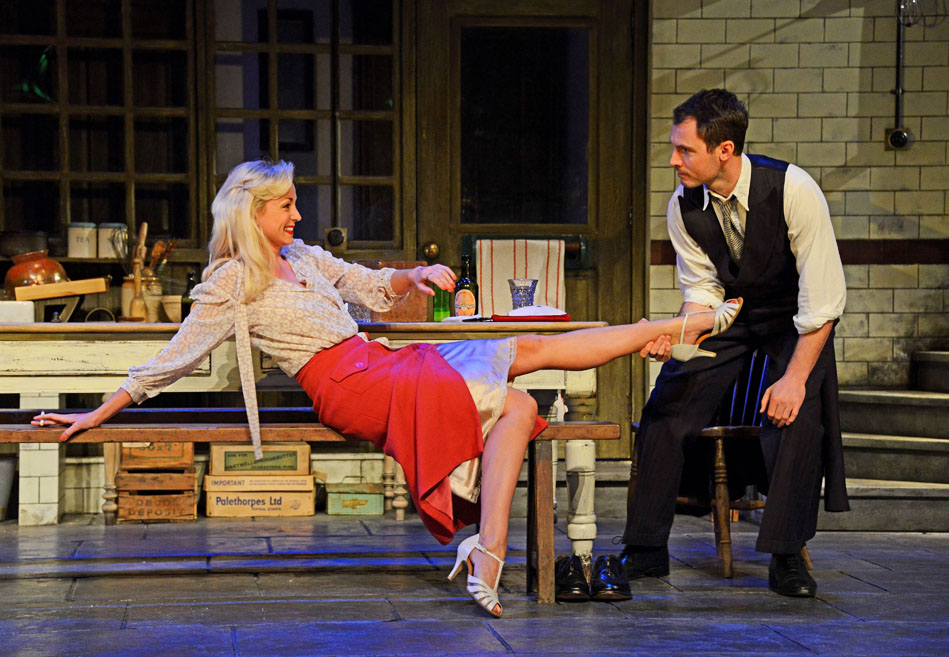
Patrick Marber’s clever reimagining of Strindberg’s Miss Julie shifts the setting from a Swedish count’s estate in the 1880s to the kitchen of an English country house in July 1945.
It is the evening following Labour’s landslide election victory, and social change is in the air. Christine is cook to the household, and we see her busily preparing a late supper for John, who is both the family’s chauffeur and Christine’s unofficial fiancé. John has broadened his horizons, both from serving as a soldier in the war and from accompanying the master of the house to various cultural events. He represents a working class that is flexing its muscles, growing in confidence and less willing show deference to those from more privileged backgrounds, even though the forelock-tugging ways of the past may prove hard to shake off. Will he be content to marry sensible, unambitious Christine? Enter the eponymous Miss Julie, the master’s beautiful but recently jilted daughter. She recognizes that this is a time of new freedoms and opportunities, but wonders if she will be able to flourish in this brave new world, or remain hopelessly trapped in a rigidly hierarchical system that is on its last legs. John seeks escape through upward mobility; Miss Julie’s escape route is less clear, though she believes she may find it below stairs. What is certain is that she is bored and frustrated, and while hard-working Christine falls asleep in the corner, she begins to flirt shamelessly with John.
Amy Cudden portrays Christine as pragmatic, restrained and dignified. She is the kind of woman who must dress in her best to go to church and who has no burning desire to break away from well-established traditions and social norms. She is looking forward to a conventional working-class life of marriage and children. John is a more complicated character than Christine, and Richard Flood succeeds in conveying the conflicted nature of his personality, torn between new-found self-assertion and the old habits of obedience. One moment he is a strutting cock-of-the-walk, the next he’s a boot-polishing servant. Helen George is Miss Julie, and she most certainly has the looks and glamour to make a convincingly predatory member of the upper class; fans of Strictly Come Dancing will know that she has the moves, too.
I had anticipated that Miss Julie’s encounter with John would be edgy, electric and dangerous, but though there are moments of real tension, they are few and far between. All too frequently whatever erotic charge there might have been is dissipated by an unconvincing shift in mood, or an inexplicable gesture. On more than one occasion there was laughter from the audience in response to scenes that were surely not intended to be comic. One such failure of mood occurs in an episode involving the killing of a pet; it should have been shocking in its brutality, yet it seemed merely silly. Paradoxically, this lack of credibility is reinforced by Colin Richmond’s entirely realistic set design, which is crammed with historically accurate details and beautifully lit by Philip Gladwell. Pans sizzle on the hob, water flows in the sink, and there is even a brief (and rather gratuitous) appearance of a real live dog, but all this naturalism tends to throw the unreality of much of the on-stage action into sharp relief.
Strindberg wanted to portray flesh and blood people with all the varied and unpredictable behaviors we see in real-life. He rejected the idea that characters should be representative of just one motivation, such as ‘fidelity’ or ‘revenge’. Consequently they are multi-layered and quixotic. Patrick Marber has stayed true to the spirit of Strindberg’s intentions, and both Miss Julie and John are written as complex characters driven by many different and often contradictory motives.
Despite these inconsistencies it is vital that we should find their behaviour credible, and in this production that is not always the case. There are some sequences where sparks really fly, such as when John gives Miss Julie a very frank analysis of her performance in bed, but ultimately this is a love-hate relationship that falls rather flat. There are silences that should crackle with unspoken threat, yet which often seem to be long pauses and nothing more. Directed by Anthony Banks, this is a production that is lovely to look at and which certainly has moments of real drama, but which fails to convince as a whole. ★★★☆☆ Mike Whitton at Theatre Royal Bath on 27th May 2016
Photos by Nobby Clark

